#Saidakrami Murodali Rachabalizoda
Text
Why Russia fears the emergence of Tajik terrorists
By Richard Foltz
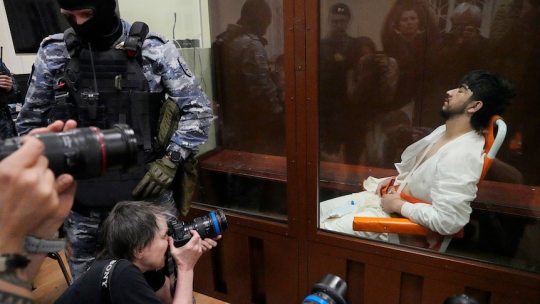
Mukhammadsobir Faizov, a suspect in Friday's shooting at the Crocus City Hall sits in a glass cage in the Basmanny District Court in Moscow. (AP: Alexander Zemlianichenko)
It has emerged that the four gunmen charged in the murder of at least 139 concert-goers at Moscow's Crocus City Hall theatre were all citizens of the small post-Soviet nation of Tajikistan in Central Asia.
Does their nationality have anything to do with their alleged terrorism? Many Russians probably think so.
Tajikistan, a landlocked country of 10 million sandwiched between Uzbekistan, Afghanistan and China, is the most impoverished of the former Soviet republics. Known for its corruption and political repression, it has chafed under the iron-fisted rule of President Emomali Rahmon since 1994.
There are estimated to be well over 3 million Tajiks living in Russia, about one-third of the total Tajik population. Most of them hold the precarious status of "guest workers," holding low-paying jobs in construction, produce markets or even cleaning public toilets.
While Russia's declining population has led to increasing reliance on foreign workers to fill such needs within its labour force, the attitude of Russians towards natives of Central Asia and the Caucasus region is generally negative.
It's similar to the American stereotype about Mexicans so infamously expressed by Donald Trump in 2015: "They're bringing drugs. They're bringing crime. They're rapists."
Non-Slavs are systematically discriminated against in Russia, and since 2022 they have been disproportionately conscripted and send to Ukraine to serve as cannon fodder at the front.
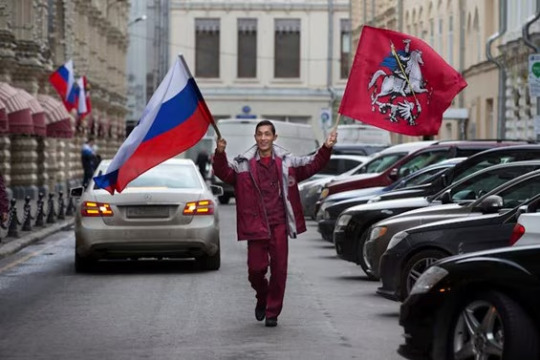
This photo was taken in April 2015. A Tajik migrant municipal worker carries Russian national and Moscow city flags to decorate a department store near Red Square in Moscow. (AP: Alexander Zemlianichenko)
Tajik exclusion
As I have described in a recent book, few nations in history have seen their standing so dramatically reduced as the Tajiks have over the past 100 years.
For more than millennium, the Tajiks -Persian-speaking descendants of the ancient Sogdians who dominated the Silk Road - were Central Asia's cultural elite.
Beginning with what's known as the New Persian Renaissance of the 10th century when their capital, Bukhara, came to rival Baghdad as a centre of Islamic learning and high culture, Tajiks were the principal scholars and bureaucrats of Central Asia's major cities right up to the time of the Russian Revolution.
The famous medieval polymath Avicenna was an ethnic Tajik, as were the hadith collector Bukhari, the Sufi poet Rumi, and many others.
But as the most significant purveyors of Central Asia's Islamic civilization, Tajiks were seen by the Bolsheviks as representing an obsolete legacy that socialism aimed to overcome.
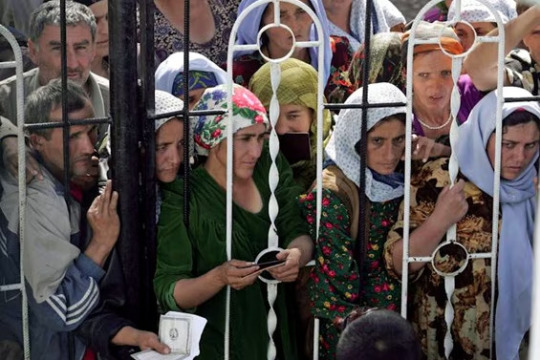
This photo was taken in 2006. Residents of Dosti, a town in southern Tajikistan, press against a fence seeking government compensation for damages caused by a strong earthquake. (AP: Sergei Grits)
The Tajiks were virtually excluded from the massive social and political restructuring imposed on Central Asia during the early years of the Soviet Union, with most of their historical territory, including the fabled cities of Samarkand and Bukhara, being awarded to the Turkic-speaking Uzbeks who were seen as being more malleable.
Only as late as 1929 were the Tajiks given their own republic, consisting mostly of marginal, mountainous territory and deprived of any major urban centres.
An impoverished region
Throughout the 20th century, the Tajik Soviet Socialist Republic was the most impoverished and underdeveloped region of the former Soviet Union, and it has retained that unfortunate status since independence in 1991.
From 1992-1997, the country was plunged into a devastating civil war that destroyed what infrastructure remained from the Soviet period. Since that time, Rahmon has used the threat of renewed civil conflict to vindicate his absolute rule.
The spectre of radical Islam emanating from neighbouring Afghanistan - where the Tajik population considerably outnumbers that of Tajikistan - has provided additional justification for Rahmon's repressive policies.
In today's Tajikistan even those with a university education find it almost impossible to earn a salary that would enable them to build a normal family life.
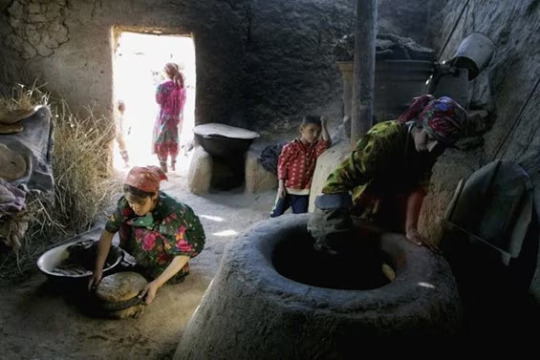
A Tajikistan family bakes bread in their home in the village of Dakhana Kiik. (AP: Sergei Grits)
Disempowered and humiliated by the system, they are easy prey for radical Islamic preachers who give them a sense of value and purpose.
The added backdrop of financial desperation makes for an explosive cocktail: one of the suspects in the recent Moscow attacks reportedly told his Russian interrogators that he was promised a cash reward of half a million Russian rubles (about US$5,300) to carry out his alleged atrocities..
Terrorism as desperation?
Normal, sane human beings everywhere are horrified by terrorist acts regardless of how they are justified by their perpetrators, and the long-suffering people of Tajikistan are no exception.
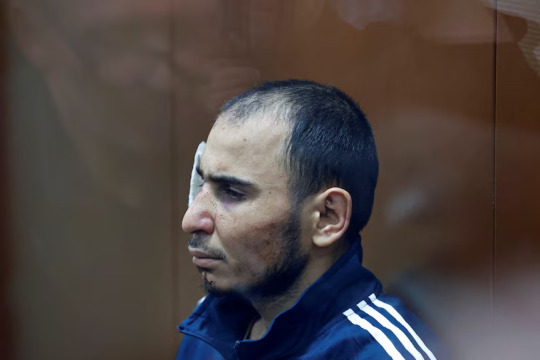
One of the four terrorism suspects Saidakrami Murodali Rachabalizoda sits in a glass cage in the Basmanny District Court in Moscow. (Reuters: Yulia Morozova)
But unfortunately, the conditions under which a small number of extremists can perceive the psychopathic murder of innocent civilians for cash or ideology as an attractive option show no signs of abating.
Russia's laughable attempt to somehow link the Moscow attacks to Ukraine is a clumsy diversion from the consequences of its relations with Central Asia.
2 notes
·
View notes
Text
In Plain Sight
Accused terrorist Shamsidin Fariduni, with bruising on his face, inside a Moscow courtroom. Photo: Yulia Morozova/Reuters via the New York Times
It seems that one of the consequences of this tragedy [i.e., the terrorist attack on the concert hall in suburban Moscow] has been the legalization, or legitimization, of torture. Torture existed before, but it was concealed and formally condemned. Now…
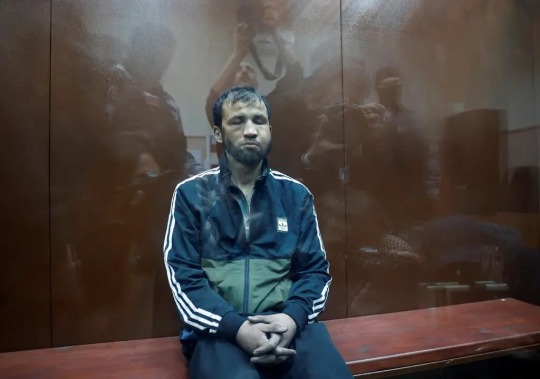
View On WordPress
#"States of Denial: Knowing About Atrocities and Suffering" (book)#Crocus City Hall#Dalerdzhon Mirzoyev#Gaza#Matt Carr#Mediazona#Muhammadsobir Faizov#Saidakrami Murodali Rachabalizoda#Sergei Babinets#Sergey Abashin#Shamsidin Fariduni#Stanley Cohen#terrorism#torture#torture in police custody
0 notes
Text
Suspects in Moscow attack put on trial, two plead guilty
Two of four suspects have pleaded guilty to appearing in court on charges of terrorist offences following the attack on a concert hall near Moscow that killed more than 130 people, Russian media reported.
Russian authorities said all four suspects, all natives of Tajikistan, were remanded in custody until at least 22 May, after which they will appear in court.
Dalerdzhon Barotovich Mirzoyev, 32, Saidakrami Murodali Rachabalizoda, 30, Shamsidin Fariduni, 25, and Muhammadsobir Fayzov, 19, appeared in Moscow’s Basmanny District Court on Sunday.
Mirzoyev and Rachabalizoda pleaded guilty after being charged. A fourth suspect, Fayzov, was taken to court directly from the hospital in a wheelchair.
A branch of the Islamic State (IS) group, IS-K, claimed responsibility for Friday’s attack. Russian authorities said the men were trying to flee to Ukraine when they were arrested.
Russian security services have published a video of the detention and interrogation of the terrorists, two of whom were caught in the Bryansk region, near the border with Ukraine. One of them said he intended to cross the Russian-Ukrainian border. Another perpetrator was apprehended near the scene.
Read more HERE

#world news#world politics#news#russia#russia news#russian news#russia politics#russian politics#moscow#moscow attack#moscow concert hall#crocus city hall
0 notes
Link
0 notes
Text
I quattro terroristi sono stati presentati in tribunale a Mosca
Nuovo post pubblicato su https://wdonna.it/i-quattro-terroristi-sono-stati-presentati-in-tribunale-a-mosca/117382?utm_source=TR&utm_medium=Tumblr&utm_campaign=117382
I quattro terroristi sono stati presentati in tribunale a Mosca

Quattro individui sospettati di essere gli artefici di un tragico evento avvenuto al Crocus City Hall di Mosca, che ha portato alla perdita di 137 vite, sono stati posti in detenzione preventiva per un periodo di due mesi da un’istituzione giudiziaria della metropoli russa.
Accusati formalmente di atti di “terrorismo”, a questi soggetti è stata prospettata la pena massima della reclusione a vita, come comunicato ufficialmente dal tribunale Basmanny di Mosca. La misura di detenzione preventiva, prevista fino al 22 maggio, potrebbe subire ulteriori estensioni in attesa che venga stabilita la data del processo.
La pronuncia del tribunale fa seguito alle accuse di terrorismo mosse dalla commissione inquirente nei confronti di due individui ritenuti partecipanti all’attentato presso il luogo dell’evento. Secondo quanto riportato dall’agenzia di stampa Tass, gli imputati sono Rachabalizoda Saidakrami Murodali e Mirzoev Dalerjon Barotovich, incriminati in base all’articolo 205, sezione 3, punto “b”, che riguarda l’esecuzione di atti terroristici da parte di un gruppo, risultati nella morte di persone. Entrambi gli imputati sono a rischio di condanna all’ergastolo.
4 terroristi
Il tribunale di Mosca ha disposto l’arresto di Dalerjon Mirzoev, identificato come uno degli implicati nell’attentato terrorista avvenuto al Crocus City Hall, secondo quanto riportato da un inviato di Ria Novosti. “La corte ha accolto la richiesta del procuratore, stabilendo la detenzione come provvedimento cautelare per Mirzoev”, ha dichiarato la giudice Elena Lenskaja. Mirzoev ha riconosciuto la propria responsabilità nell’attacco.
Per quanto riguarda Shamsidin Fariduni, il quarto sospettato coinvolto nell’azione terroristica, si è deciso di procedere con un processo a porte chiuse. Tale decisione è stata presa al fine di salvaguardare i dettagli riservati delle indagini e le identità dei partecipanti al procedimento giudiziario, come comunicato da Ria Novosti. Il quarto imputato è stato introdotto nell’aula di tribunale su una sedia a rotelle, accompagnato da personale medico, segnalando la presenza di condizioni fisiche particolari, come indicato dall’agenzia di stampa russa.
0 notes